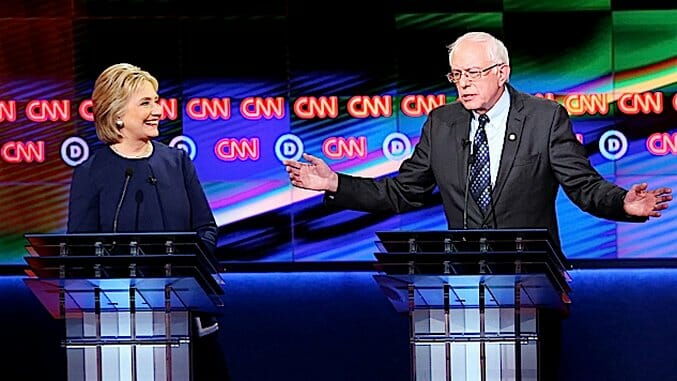Who’s Worse: Bernie Sanders, or a Press that Uses the Subject of Mental Health for Political Point-scoring?
Photo by Scott Olson/Getty Politics Features Bernie Sanders
After Sunday night’s Democratic debate, the media were quick to take Bernie Sanders to task; for his ill-advised ‘white people don’t know what it’s like to be poor’ comment, for his insistence that Hillary Clinton stop interrupting him as he spoke, and – most significantly – for his line on the state of the GOP candidates’ mental health. This is what Sanders said on the latter: “We are, if elected president, going to invest a lot of money into mental health. And when you watch these Republican debates, you know why.”
Almost immediately, publications including the Washington Post and Vox were quick to unleash commentary. Articles with titles like, ‘Mental health patients to Bernie Sanders: Don’t compare us to the GOP candidates’, and, ‘Sanders meant to insult Republicans. He insulted people with mental illness instead’. These positioned Sanders as demon of an entire community, one consisting of roughly one quarter of the world population. WashPo and Vox weren’t alone: they were joined by Forbes, the LA Times and others in their righteous anger. (As former White House counselor Bill Curry put it regarding the mainstream media’s distaste for Bernie Sanders, “The nation may be divided but at least its pundits speak as one.”)
Such articles made the argument that Sanders was both trivialising the subject of mental health and comparing none-too-happy sufferers to the GOP. Indeed, they cited tweets from an outraged public: “My mental health is not a joke,” “joke was low moment for @BernieSanders,” “Bigotry is not a mental illness.” (I would add here that while bigotry is most definitely not a mental illness, classicnarcissism and a propensity for compulsivelying aren’t exactly signifiers of a healthy mind, either.)
Full disclosure: I support Bernie Sanders. I have also, like so many people, suffered from anxiety and depression all my adult life. I don’t however treat my mental health issues as though they’re sacrosanct. So I didn’t, as fellow Sanders supporter Wil Wheaton put it, “wind myself up into a big ball of righteous outrage” about what Sanders had to say.
I don’t claim to speak for all of the many, many people who deal with mental health problems worldwide. Though I am, according to statistics, one of the roughly 700 million globally who suffer from anxiety and depression, so I count myself as part of this community that the media claims to speak for, and which it claims was universally outraged Sunday night. I was not outraged, but of course others took the joke differently; they have the right to be offended in the same way I have my right not to be. My problem isn’t with those people. My problem is with the press that took a selective handful of tweets written by sufferers, then used them to sell an anti-Sanders agenda, apparently on behalf of me and everyone else who’s ever had to deal with mental illness.
There’s no shortage of evidence to suggest that those outlets that are apparently deeply unhappy with the Sanders campaign are also often compromised. Prominent Vox and New York Times writers have lately suspiciously made a 360 with their views in order to attack Sanders; The Daily Beast’s parent company has Chelsea Clinton on its board of directors; even The Onion – which began publishing nakedly pro-Clinton ‘satire’ immediately after being bought out – is now controlled by a top Clinton donor. But let’s look specifically at the Washington Post, whose piece, ‘Mental health patients to Bernie Sanders: Don’t compare us to the GOP candidates’, has been so widely shared.
The Washington Post’s partiality this primary season has been so clear that team Clinton has actually been using WashPo articles in its campaign. As late as last year, when the Vermont senator was surging in the polls, WashPo was barely giving the Sanders campaign coverage, but as Sanders has become more of a threat the paper has ramped up its coverage significantly, in the form of a series of negative articles. Just yesterday, the media watchdog FAIR counted an astonishing 16 anti-Sanders articles in just 16 hours from the Post.
Could there be a reason why? Well, Washington Post owner and Amazon founder Jeff Bezos – who it’s said has taken a “hands-on role” at the Post – is a stern opponent of higher taxes, putting him in direct opposition with someone like Bernie Sanders. Bezos is also an acquaintance of Obama’s, and was awarded a $16.5 million contract while Clinton was secretary of state. It’s only speculation, but you might say the Washington Post has a few good reasons for so frequently attacking Bernie Sanders.
So when the Washington Post writes that Sanders “belittled mental health patients”, I don’t see an expression of sympathy for what people like me really feel. I see an article that’s part of a pattern; another story concocted to convince readers that a certain candidate doesn’t deserve their vote. I see using the subject of mental health for political point-scoring.
Should Bernie Sanders have made light of mental health issues on Sunday night? Perhaps not, though I don’t consider his pretty minor joke one that I – as someone with a history of problems – am allowed to make that other people without such a history aren’t. (Incidentally, I have no idea whether Bernie Sanders has ever had to deal with mental illness. Neither do the press, for that matter.) More offensive to me than a flippant remark is a media affecting compassion in order to make members of a vulnerable community pawns in their games of bias.